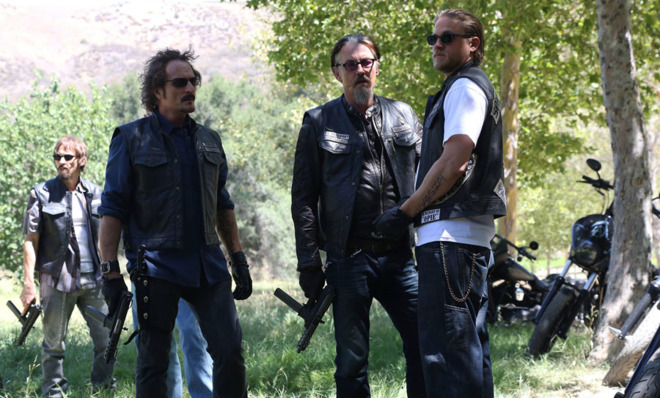Why Sons of Anarchy was shut out of TV's 'golden age'
Why is FX's biker drama barely mentioned in discussions of the renaissance of quality TV?


A free daily email with the biggest news stories of the day – and the best features from TheWeek.com
You are now subscribed
Your newsletter sign-up was successful
Sons of Anarchy — which premiered in 2008, alongside the final season of The Shield — is the elder statesman of FX's current drama lineup. The ratings of the popular biker drama have routinely dwarfed critical darlings like Justified, The Americans, and Fargo.
But last night's movie-length premiere, which kicked off the seventh and final season, went relatively unheralded. Apart from the usual smattering of reviews and a few key interviews, the beginning of the end was a non-event. There were no think pieces on the show's role in the TV landscape, and no grand histories of its evolution over the past six years. Even Mad Men — which aired just the first half of its final season earlier this year — garnered more gauzy-eyed appreciations.
Why has Sons of Anarchy been all but shut out from the so-called "golden age of television"? On paper, the show has all the trappings of the era's staples: a twisty, hyper-serialized narrative; a dark, morally dubious protagonist; a continuous stream of shocking, buzzy plot developments; and a willingness to kill off pretty much anybody. Sons of Anarchy was doing it all years before Game of Thrones, True Detective, or House of Cards premiered — so why is it barely mentioned in discussions of the renaissance of quality dramatic TV?
The Week
Escape your echo chamber. Get the facts behind the news, plus analysis from multiple perspectives.

Sign up for The Week's Free Newsletters
From our morning news briefing to a weekly Good News Newsletter, get the best of The Week delivered directly to your inbox.
From our morning news briefing to a weekly Good News Newsletter, get the best of The Week delivered directly to your inbox.
At the very least, a lack of explicit content isn't Sons of Anarchy's problem. At a time when plenty of allegedly "boundary-pushing" dramas don't actually push any boundaries, Sons of Anarchy has served up a wide array of previously untold horrors: a man forced to watch as his daughter was burned to death; a horrific school shooting; a man drowned in a bathtub full of urine; and the near-constant threat of sexual violence, including gang rape and prison rape. "It's not that my goal is to disturb people," explained Sutter at this year's Television Critics Association press tour. "But I also want that reaction to when beloved characters go away. I want people to be upset."
Of course, a violent show isn't the same thing as a mature show. Entrenched classics like The Sopranos and Breaking Bad delivered plenty of violence, but their existential and emotional horrors always rang out louder. At its best, the violence in Sons of Anarchy packs a similar punch; at its worst, Sons of Anarchy is stupidly gratuitous.
But I think the relative lack of recognition for Sons of Anarchy is due to to more than its own unevenness. Brett Martin's Difficult Men — one of the primary documents of the modern TV era — chronicles TV's "creative revolution" through the prism of four "complicated, idiosyncratic, and 'difficult'" showrunners: David Chase (The Sopranos), David Simon (The Wire), Matt Weiner (Mad Men), and Vince Gilligan (Breaking Bad).

If being a "difficult man" is the standard for pushing the medium forward, Sons of Anarchy's Kurt Sutter unquestionably belongs on the list (and Vince Gilligan doesn't belong anywhere near it). But there's a key difference between Sutter and the men Martin listed: Sutter is the only one who has routinely alienated TV critics.
A free daily email with the biggest news stories of the day – and the best features from TheWeek.com
Of course, passionate creators rarely respond well to criticism of their work, but Sutter's responses to criticism tend to be both uniquely nasty and uniquely personal. In a 2011 blog post, Sutter singled out several well-regarded critics who he concluded weren't "committed to the integrity of their jobs"; in a tweet last year, he leveled a petty personal attack at a critic from The AV Club who had given a recent episode a mediocre review. ("Kurt Sutter vs. Critics, Round Infinity," sighed Myles McNutt in a 2012 blog post chronicling the various battles Sutter has picked.)
Unlike Sutter, I don't think most TV critics prioritize speed or personal vendettas over the integrity of an honest review. (It's worth noting that most of those critics have continued reviewing the series, and that Sutter's attacks don't seem to have had any impact on their overall opinion of the show.) I think it's possible to be impressed by Sons of Anarchy and annoyed by Sutter's prickliness at the same time.
But I also think it's easier to see the flaws of Sons of Anarchy — which routinely toes the line between gripping, propulsive storytelling and needlessly graphic misery porn — in the context of Sutter's off-screen behavior, which ranges from insightful and impressive to bizarrely petty and mean-spirited. Like its creator, Sons of Anarchy sometimes goes places it shouldn't; like its creator, Sons of Anarchy sometimes comes off as thoughtless and cruel. At the very least, the chatter surrounding some of Sutter's more inflammatory comments has sometimes drowned out discussion of the show itself.
It's a shame, because there are many things about Sons of Anarchy that merit close, thoughtful critical analysis. In 2008 — a time when FX's future was balanced on the backs of aging dramas like Nip/Tuck and Rescue Me — Sons of Anarchy was both a shot in the arm and a statement of purpose, propelling the channel into its second wave of top-notch television. In its best moments, Sons of Anarchy could go toe-to-toe with pretty much anything on television. It may not belong in the pantheon of all-time greats, but it deserves to be more than a footnote.
**Embedded image: Frank Micelotta/Invision for Academy of Television Arts & Sciences/AP Images**
Scott Meslow is the entertainment editor for TheWeek.com. He has written about film and television at publications including The Atlantic, POLITICO Magazine, and Vulture.
-
 The ‘ravenous’ demand for Cornish minerals
The ‘ravenous’ demand for Cornish mineralsUnder the Radar Growing need for critical minerals to power tech has intensified ‘appetite’ for lithium, which could be a ‘huge boon’ for local economy
-
 Why are election experts taking Trump’s midterm threats seriously?
Why are election experts taking Trump’s midterm threats seriously?IN THE SPOTLIGHT As the president muses about polling place deployments and a centralized electoral system aimed at one-party control, lawmakers are taking this administration at its word
-
 ‘Restaurateurs have become millionaires’
‘Restaurateurs have become millionaires’Instant Opinion Opinion, comment and editorials of the day
